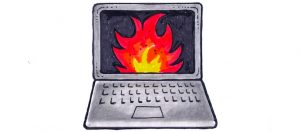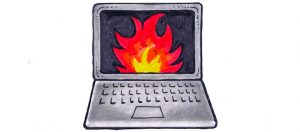
In practice, this executive order would mean that whichever political party is in power could dictate what speech is allowed on the Internet.
By Jon Queally,
Common Dreams (8/11/19)
Civil liberties groups are warning of a major threat to online freedoms and First Amendment rights if a leaked draft of a Trump administration edict—dubbed by critics as a “Censor the Internet” executive order that would give powerful federal agencies far-reaching powers to pick and choose which kind of Internet material is and is not acceptable—is allowed to go into effect.
According to CNN, which obtained a copy of the draft, the new rule “calls for the FCC to develop new regulations clarifying how and when the law protects social media websites when they decide to remove or suppress content on their platforms. Although still in its early stages and subject to change, the Trump administration’s draft order also calls for the Federal Trade Commission to take those new policies into account when it investigates or files lawsuits against misbehaving companies.”
“Regardless of how you feel about the president,” the group said, “this is a terrible idea that will have the exact opposite impact of its stated purpose of protecting free speech.”
While Politico was the first to report how the draft was being circulated by the White House, CNN notes that if put into effect, “the order would reflect a significant escalation by President Trump in his frequent attacks against social media companies over an alleged but unproven systemic bias against conservatives by technology platforms. And it could lead to a significant reinterpretation of a law that, its authors have insisted, was meant to give tech companies broad freedom to handle content as they see fit.”
Anti-American edict
Following reporting on the leaked draft, free speech and online advocacy groups raised alarm about the troubling and far-reaching implications of the Trump plan if it was put into effect by executive decree.
“It’s hard to put into words how mind bogglingly absurd this executive order is,” saidEvan Greer, deputy director of Fight for the Future, in a tweet. “In the name of defending free speech it would allow mass government censorship of online content. In practice, it means whichever party is in power can decide what speech is allowed on the internet.”
PEN America, which defends the free expression for writers, journalists, and others, warned that any executive order based on this draft rule would be an unconstitutional “anti-American edict.”
As detailed in an action alert put out by Fight for the Future over the weekend:
[The] leaked documents show that the Trump administration is drafting an executive order that, if upheld by the courts, could essentially end free speech on the Internet. The draft order would put the FTC and the FCC, headed by its notoriously corrupt chairman Ajit Pai, in charge of monitoring and policing online speech on social media platforms, online forums, and more.
It would give these bureaucratic government agencies unprecedented control over how Internet platforms moderate speech by allowing them to revoke the essential protections Congress laid out in Section 230 of the Communications Decency Act (CDA). CDA 230 is the basic law that makes it possible for online platforms to let users post our own content, and to make basic decisions about what types of content they as private entities want to host. Every meme, every social media post, every blog and user-created video on the Internet has been made possible by this crucial free speech protection.
In practice, this executive order would mean that whichever political party is in power could dictate what speech is allowed on the Internet. If the government doesn’t like the way a private company is moderating content, they can shut their entire website down.
“These leaks about a potential Executive Order from the White House are troubling on many levels, from the order’s potential to violate the First Amendment, to its apparent disregard for the independence of agencies like the FCC and the FTC, to its intent to unilaterally limit Section 230 which promotes moderated online communities free of hate speech and misinformation,” said Chris Lewis, president and CEO of Public Knowledge.
“If these reports are a trial balloon from the White House,” Lewis added, “then it’s time to pop it.” ,,,
(Our work is licensed under a Creative Commons Attribution-Share Alike 3.0 License. Feel free to republish and share widely.)

